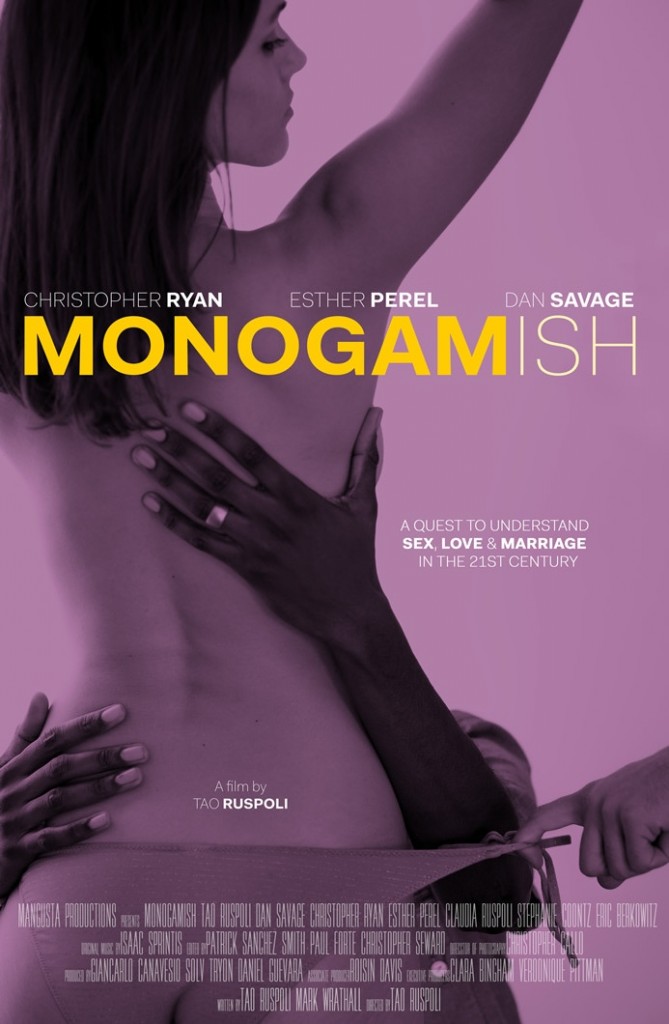Recovering from a heartbreaking divorce, independent filmmaker and son-of-an-Italian-Prince Tao Ruspoli takes to the road in his film Monogamish to talk to his relatives, advice columnists, psychologists, historians, anthropologists, artists, philosophers, sex workers, sex therapists, and ordinary couples about love, sex & monogamy in our culture. What he discovers about his very unconventional family, and about the history and psychology of love and marriage leads him to question the ideal of monogamy, and the traditional family values that go with it.
In this interview, Giancarlo Canavesio talks to Tao about the process of making this film, and how his opinions of polyamory have developed as a result.
Monogamish is in theaters nationwide on October 13, 2017. Click here for theaters and showtimes.
Monogamish Trailer:
Giancarlo Canavesio: What was the genesis of the documentary? How did it come about?
Tao Ruspoli: I had a fabulous 75-year-old neighbor named Roberta with blue hair and a hot 40-year-old boyfriend. I was heartbroken, in the midst of my divorce, and I couldn’t sleep at night. Every morning at about 4 am I’d see her light was on, and I’d ask if I could go over for breakfast. We’d drink coffee and she’d give me relationship advice.
This friendship inspired a short film called The Love Project. This was such a hit with everyone who saw it that I thought this could turn into a feature length project. Little did I know this would turn into a 5 year adventure, traveling around the world talking to sex therapists, sex workers, lawyers, historians, anthropologists, couples, triples, and so many others. I even ended up at a free love commune in Portugal!
What was the most surprising and unexpected thing you discovered?
Tao Ruspoli: Going in, I didn’t even know there was such a thing called polyamory. I had no idea monogamy and marriage were deeply political subjects. Most importantly, I didn’t know there were a thousand ways to organize intimate relationships, and I didn’t realize the extent to which we believe, wrongly, that the way things are is the way they have always been and the way they always need to be.
What was the most frustrating and challenging thing you found?
Tao Ruspoli: It’s hard to be too frustrated because these issues are so delicate and touch us so deeply and are so interconnected to our childhoods and our rawest insecurities, but of course a part of me wished and wishes people would be more open to exploring the outer boundaries of their comfort zones, and to see if maybe they too are better suited to a different type of relationship model. The good news is I do think the culture is changing right before our eyes, and that we are living in the midst of a true paradigm shift surrounding love, marriage and relationships.
How has this exploration affected your beliefs and preferences about relationships?
Tao Ruspoli: There are no easy answers to these questions, and of course if there was one solution to these problems, someone would’ve figured it out much before me and we’d all be living that way. The most important thing I learned is that however complicated I might have thought issues surrounding love and marriage are, it’s actually even more complicated than that! The effect making the film had on me, and the effect I hope it also has on viewers, is to give us the tools to have deeper, more nuanced, and ultimately more authentic rapports with our sexuality and with the way we engage with the people we love and choose to live with.
What is the most compelling argument against polyamory?
Tao Ruspoli: One of the most compelling arguments I encountered for monogamy is that it’s a very egalitarian ideal, in the sense that everyone gets one person. In cultures where wealth and power is concentrated in a few, often male, members of the species, the result is that a) women flock to these few powerful men and b) other men have nothing to lose to try to become one of these men. The result is higher crime and a generally less stable society. I think polyamory can only work in a culture where women are equals, where they are not dependent on men for a roof on their heads and as the only way to feed the children. We aren’t there yet obviously, but hopefully we are getting closer.
What advice would you give to monogamous couple thinking of opening up their relationships?
Tao Ruspoli: Just be honest, always—to yourself and to your partner.
Do you think it is possible to raise kids in polyamorous situation?
Tao Ruspoli: Yes. I haven’t had the opportunity yet, but I’ve seen enough examples of thoughtful, sensitive, open minded parents raising their children in non-monogamous relationships.
Why did you not explore the spiritual side of monogamy?
Tao Ruspoli: I tried to tackle religion, economics, politics, sociology, patriarchy, and so many other subjects that influence the way we structure our relationships. I think with all this knowledge, people can integrate their own spiritual practices and beliefs into the way they decide to approach their relationships. I wanted to be very careful not to give prescriptive answers, and of course never to preach. I’d much rather help people ask the right questions and then to answer them in their own way. Of course this is only one film and a small part of a much larger dialogue we need to have.
***
For theaters and showtimes, visit: https://www.monogamishmovie.com/
















